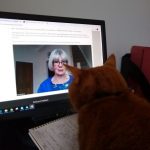Teaching through the pandemic… and beyond
 We are delighted that Professor April McMahon, Vice-President for Teaching, Learning and Students, is rounding off our series of posts reflecting on teaching and living through the pandemic. Here the focus is on silver linings, including the paradox that relying on technology has made us more aware of our humanity, and how we can all build on that in our teaching and learning practice going forward.
We are delighted that Professor April McMahon, Vice-President for Teaching, Learning and Students, is rounding off our series of posts reflecting on teaching and living through the pandemic. Here the focus is on silver linings, including the paradox that relying on technology has made us more aware of our humanity, and how we can all build on that in our teaching and learning practice going forward.
‘Teaching through the pandemic’ makes me think of ‘Dancing through the dark’ (or possibly ‘…through the fire’). Universities and university teaching have certainly been in the spotlight, though it has sometimes felt more like tightrope-walking under those lights than dancing. And not everyone has been throwing roses.
Being in the spotlight is not everyone’s cup of tea. On the other hand, as Claire McGourlay points out in her massively energising blog, the pandemic did mean that ‘Learning and teaching was having its moment, and not before time, I might add.’ Any doubts that teaching and the student experience are central to our very existence as universities must surely have evaporated now. Coming out of the pandemic with a greater respect for the extraordinary skills and impact of our excellent educators, and closer to parity with research, would be quite a spectacular silver lining to the Covid cloud.
I am hugely proud of the way our University has approached the shift to blended (and in the pandemic period, sometimes wholly online) teaching as a genuine learning community. As Jenni Rose makes clear in her post, this is not just about mastering new technology, but about helping one other find new ways to do the right things – supporting students to engage, connect, and manage their time. We have developed how-to guides, started discussion groups, and as Dan Jagger notes, greatly expanded some of our teams.
Paradoxically, though we have mainly been distant from one another, aspects of Zoom and Teams have been humanising. Sometimes it’s too easy to see the role and not the person (and Manchester can be…well, quite hierarchical). But in pandemic teaching and meetings, we’ve been in each other’s homes; met children and cats; chatted while someone rushed to the door for a life-saving parcel from a ‘non-essential’ shop. This humanising effect runs through the blogs – Dan talks about his team, even though he hasn’t met all of them; Jenni talks about cooking for and with her children; Claire talks about her two dogs, her family skydiving, and breaking her ankle in 2018 (I don’t believe the last two events were related). Let’s come out of Covid remembering we are all people, and all learning, regardless of whether we are students or staff, and what roles we have.
So how do we keep changing in a positive way? Claire says, ‘I started asking myself, what could I do that would make the student experience better’, and it’s an excellent question. We’ve had a lot of change lately – as Dan observes, ‘Anyone who has worked at this University for a period of time will know that in an institution of this size, change doesn’t happen fast. Unless of course we’re thrust into a global pandemic and then all bets are off.’ I know some colleagues just want everything to go back to the way it was. But honestly – what a waste that would be! Every one of the blogs in this series talks positively about our learning and insights about what actually works in a blended space.
This is our chance for Manchester to be at the forefront of a real debate about the future of university teaching. But we need to be honest with ourselves, and recognise that some of the ways of working we’re very familiar and comfortable with don’t work any more, maybe not for us, and definitely not for all of our students. When everything else has changed radically around us in universities, why are we still doing some of our teaching in the same way as when the University of Bologna was founded in 1088?

Students still talk about university teaching as being synonymous with lectures. That is far from the truth, but perhaps sometimes we encourage it. Do we feel so attached to the lecture because it’s genuinely useful to students, or because we rather like the idea of being individual performers, in the spotlight, after all? What does the decline in attendance at lectures over the past decade tell us? And are we helping students to truly develop into independent learners, when our archetype of the university teaching and learning event is primarily passive?
Now, before you queue up to shoot the messenger, the irony is that most of our ‘lectures’ aren’t actually lectures in this sense any more. In the blended learning glossary, we’ve recognised that there are at least three types of ‘lecture’, depending on their interactivity. Colleagues in Criminology and Computer Science, for instance, are considering moving away from the term ‘lecture’ altogether except for occasional, large, community-building events. How do we make the rest of our teaching and learning genuinely flexible, blended and interactive? And what facilities do we need to bring that aspiration to life? A massive thank you to all the people involved in this blog series, who have helped staff across the university to understand and unlock the benefits of blended learning. Please get involved and let’s build the Manchester Model of Flexible Learning together.







0 Comments